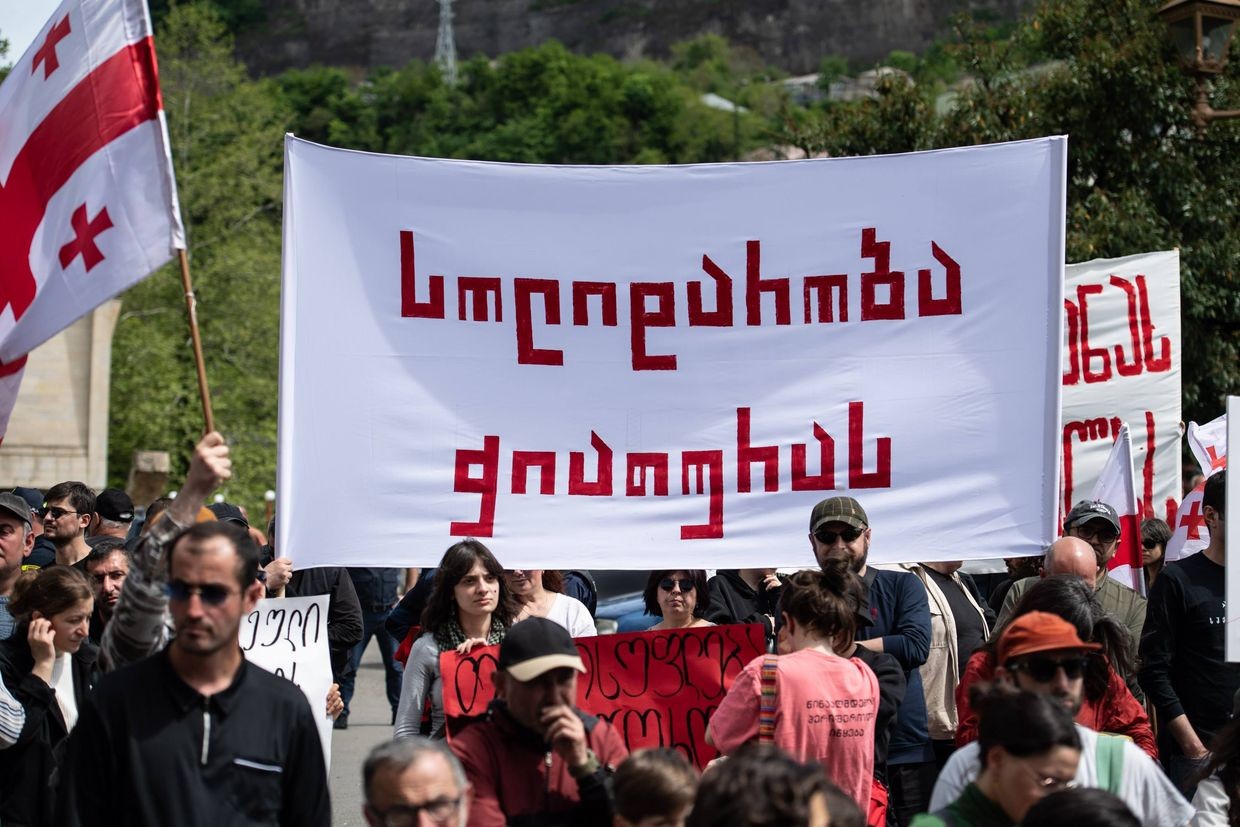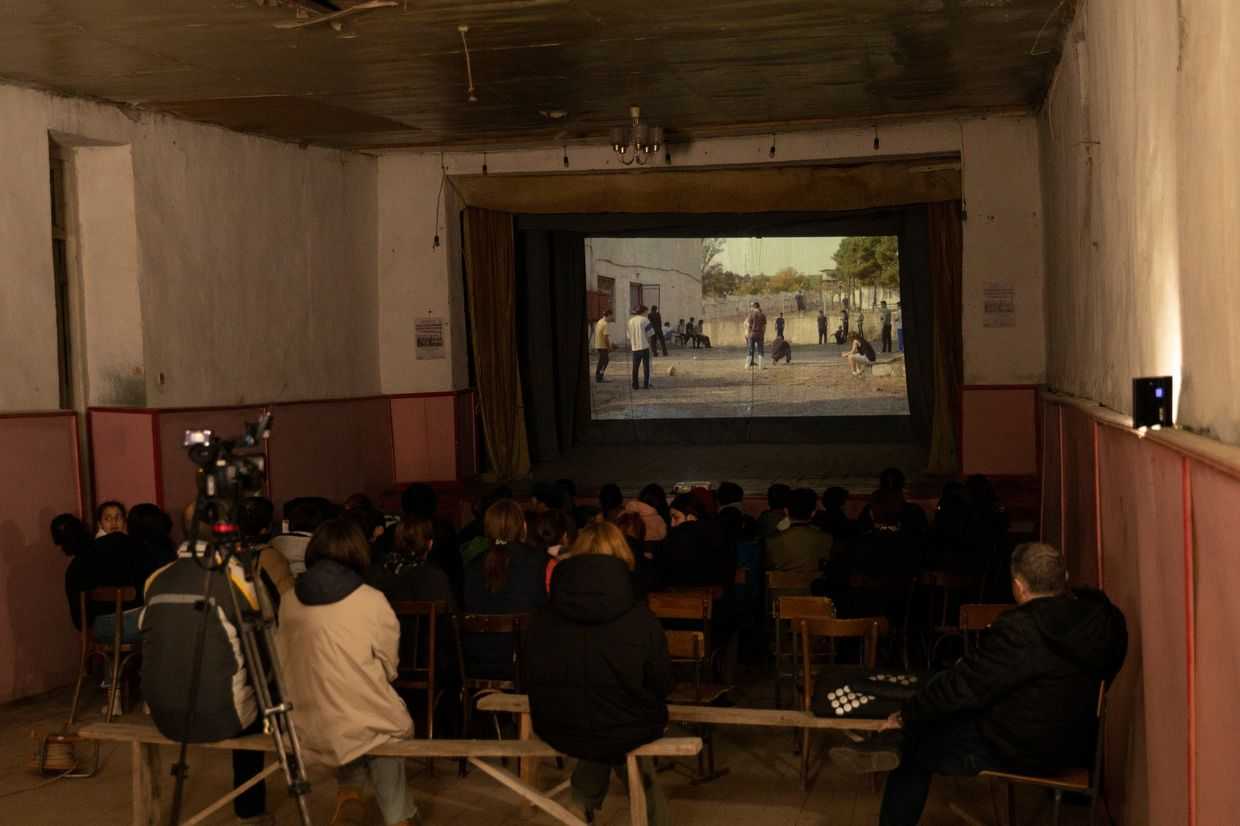
Protests were held on 1 May to mark International Workers’ Day in the Georgian capital Tbilisi as well as in the town of Chiatura, where local miners have been protesting against their employer since February.
The protest in Tbilisi was organised by the newly formed Movement for Social Democracy and ten labour organisations, including the Union of Social Workers, the Guild, which consists of media and culture workers, and the Professional Association of Mediators.
Demonstrators gathered at the capital’s Orbeliani Square.
Organisers said the country was facing a ‘deep crisis’, with ‘authoritarianism extinguishing democracy’, and citizens being forced to choose ‘between medical treatment and paying off debt, between food and utility bills’.
‘Society needs change based on social justice, labour rights, and a state focused on people’s well-being’, they declared.
Protesters against Georgia's EU U-turn are marching in Tbilisi on International Labour Day. pic.twitter.com/3JQcER95B2
— OC Media (@OCMediaorg) May 1, 2025
‘Markets should not be on fire — oligarchy should’, read one of the posters, referencing the blaze that broke out Wednesday at Tbilisi’s Station Square, which financially devastated hundreds of vendors.
Later, the protesters marched to the Government administration building and continued to parliament, where they joined the ongoing anti-government protest, now in its 156th day, demonstrating against the government’s EU U-turn.
International Workers’ Day, 1 May, is not an official public holiday in Georgia.
Georgia’s largest union opts out
The Georgian Trade Unions Confederation (GTUC), which for years had organised 1 May street rallies, did not take to the streets this year. Instead, it set up ‘open spaces’ at various locations to distribute informational materials on labour rights and offer ‘consultations’ to the public.
The GTUC is the country’s largest labour union, uniting 21 sectoral unions and claiming to have around 150,000 members.
The GTUC also refrained from holding a street rally last May Day, when, as now, large-scale anti-government protests were taking place in central Tbilisi, which at the time were organised against the controversial foreign agents law that was enacted in May 2024
At the time, the GTUC cited the political climate as the reason for not demonstrating, claiming there was ‘no space left to discuss the most important issues’, such as the minimum wage, a transition to progressive taxation, or the introduction of unemployment benefits.
The GTUC’s chair, Irakli Petriashvili, defended the union’s decision not to take part, telling OC Media that their informational campaign had been a success.
‘To increase turnout at [labour] protests, it’s important to raise awareness’, he said, asserting that the GTUC had reached around 13,000–15,000 people on Thursday with its information campaign on labour rights through various means.
‘We’ve never had 15,000 people at our [previous] rallies, so I believe this was the most fruitful May Day yet’, Petriashvili added.
Asked if GTUC’s absence from the streets was related to avoiding participation in the protest organised by other trade union groups, Petriashvili said he did not know which groups had organised the rally.
Petriashvili said he welcomed the formation of new unions, but added that ‘being a union means having members’ and that ‘a trade union is an association of employed people, not the unemployed’ — an apparent slight against the organisations that took part.
The GTUC has frequently faced accusations of being too close to the government. On the eve of October 2024 parliamentary elections, Petriashvili, appeared on pro-government TV channel Imedi where he attacked the opposition United National Movement (UNM) party and repeated some Georgian Dream messages, including condemning ‘LGBT propaganda’.
GTUC has denied it has political affiliations, instead asserting the organisation has full political independence under Petriashvili’s rule.

Protests continue in Chiatura
Outside of Tbilisi, a protest was also held on Thursday in Chiatura, where four miners were detained earlier this week. The miners’ protest against their employer has been ongoing for over two months.
Alongside the miners, members of the Movement for Social Democracy also joined the protest, as did representatives from some trade unions, including the LABOR union and the Guild.
The miners had repeatedly called on the government to pay attention to their demands, which included the restoration of underground operations in the mines — work that the manganese mining company Georgian Manganese halted in October, citing ‘financial unprofitability’.
On International Labour Day, protests continue in Georgia’s Chiatura against Georgian Manganese, which is responsible for several mines in the region, in demand of better working conditions. Several of the protesting miners are on hunger strike. pic.twitter.com/3GtzSGmFbD
— OC Media (@OCMediaorg) May 1, 2025
The miners stated that the suspension of operations was causing serious financial hardship for the town, whose residents rely primarily on mining as their source of income — Georgian Manganese is the largest employer in the town.
On 22 April, the Chiatura Management Company (CMC), which runs the mines on behalf of Georgian Manganese, said that production would resume only if there were a ‘reorganisation’, which miners expect would leave many of them unemployed.
A number of miners also began a hunger strike in order to draw authorities’ attention to the issue, but on 29 April four of them were arrested for reportedly attacking the head of the mining company after he allegedly called them a ‘herd of cattle’.
Giorgi Neparidze, Merab Saralidze, Tengiz Gvelesiani, and Achiko Chumburidze were initially detained on charges of causing intentional minor injury.
Saralidze and Neparidze were later charged with organising and participating in group violence, an offence that carries a prison sentence of 6 to 9 years. Chumburidze and Gvelesiani, meanwhile, have been accused of participating in a group offence, which is punishable by 4 to 6 years in prison.











